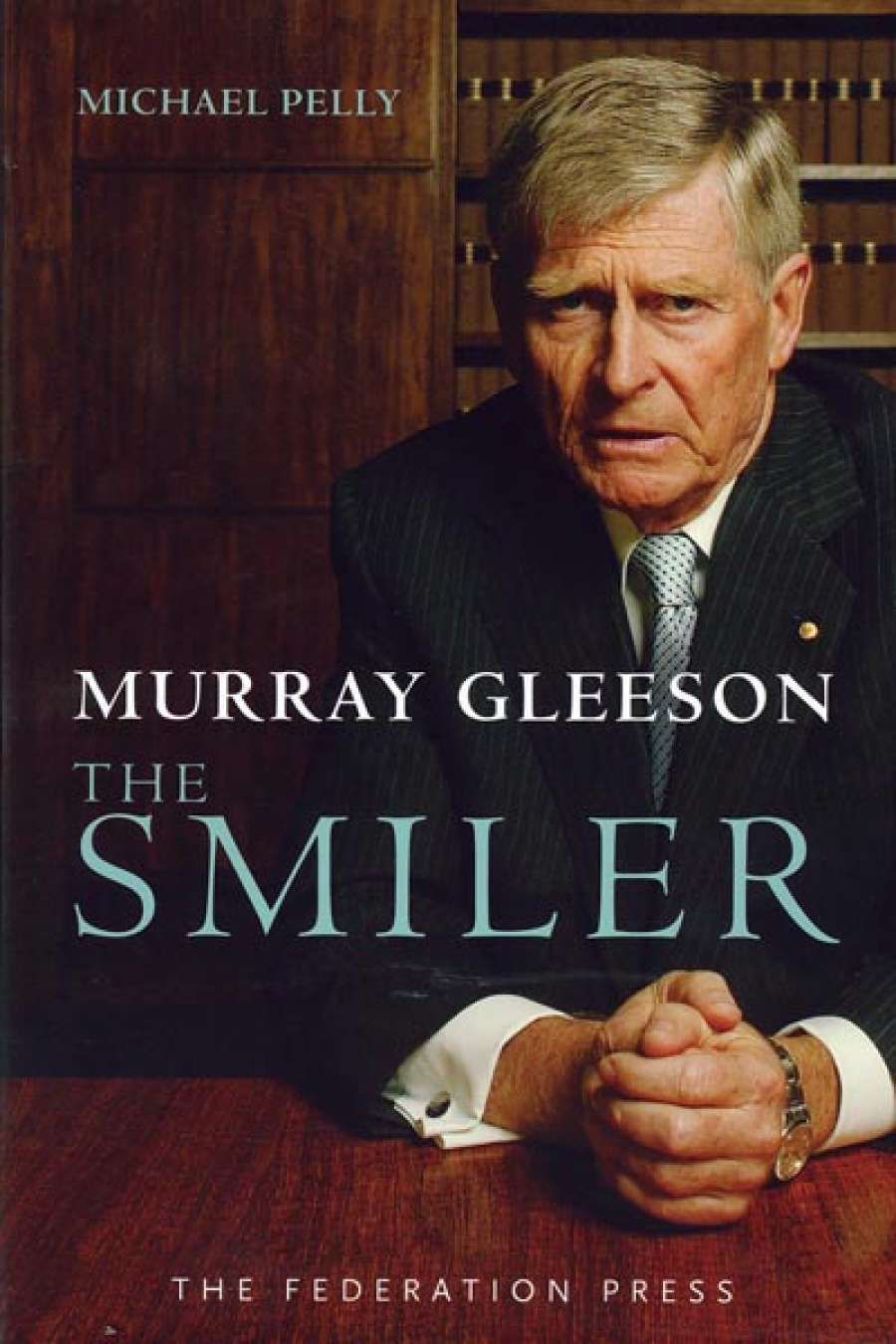
- Free Article: No
- Contents Category: Law
- Custom Article Title: David Harper reviews 'Murray Gleeson' by Michael Pelly
- Review Article: Yes
- Online Only: No
- Custom Highlight Text:
Although a few can pull it off, most judges have the good sense not to attempt an autobiography. Judges’ personalities are not usually of such outstanding interest, and their lives generally do not so engage with the world, as to generate the stuff from which autobiographies worth publishing are made. The reserve which the judicial experience inculcates, and the general inability to expose judicial life in prose that does not condemn the reader to death by suffocation, are additional inhibitors. Even those tragics who think that the judiciary occupies a place of mystical significance use the autobiographies of their colleagues as a cure for insomnia.
- Book 1 Title: Murray Gleeson
- Book 1 Subtitle: The smiler
- Book 1 Biblio: Federation Press $59.95 hb, 278 pp
This is Murray Gleeson, The Smiler – in one sense, a most inauspicious subject for a biography. There is nothing of particular interest in his private life. Even the elements of significance in his public and professional career have to be teased out of the humdrum interstices of the daily round. In Pelly’s hands and pen, however, The Smiler takes his rightful place as one who transcended all judicial norms. In the process, Gleeson made many wilt; and not all of his victims were by any means merely florally decorative. It was not just the force of his stare, though that was part of it. His entire personality – his intellect, his capacity for intense concentration, his knowledge of the law, his ability to project a sense of power and purpose – combined to make him not merely the chief justice of Australia, but also one of the greatest occupants of that office. Today, six years after his retirement in 2008, he continues to be held in awe even by those who knew him only from a distance. His influence on the legal profession, not only as a judge but also as an advocate, was unparalleled in his time. His impact on the governance of the nation, and on its commercial life and judicial administration, was profound. Yet it was exercised with the appropriate quietude of judicial restraint. It is right that that impact now be exposed by one with the ability to reveal the light and shade, even drama, which was a vital part of it.
 Murray Gleeson (photograph by Andrew Quilty, nla.pic-vn6347112-v)
Murray Gleeson (photograph by Andrew Quilty, nla.pic-vn6347112-v)
Pelly could not make a success of this biography unless he achieved two things. First, the subject had to be presented to the audience for what he was and is: a man with an incisive legal mind and a personality which exudes the firm, almost steely, authority that made him the dominant figure in any company. Without these characteristics being given the life and colour they deserve, the biographical element would be atrophied into irrelevance. The other personal elements – shyness, a capacity for warmth and empathy which is restricted to a small circle of family and friends, a relatively narrow range of interests – were only worth exploring in order to complete the Gleeson portrait. This Pelly does with an artist’s touch.
The second ingredient necessary if Gleeson’s life is to be given its due is a clear and accurate account of his considerable, and considerably beneficial, influence over national affairs. This Pelly handles with adroit skill. It is no easy task if the interest of the lay reader is to be coordinated with the critical attention of an audience of lawyers. But Gleeson’s involvement as barrister or judge in many of the most significant pieces of litigation of the past four decades is so well narrated, and the importance of the cases so cleverly woven into their legal, commercial, and political context, that the pages continue to turn as the mind is drawn onwards into the text.
Drama comes frequently to courtrooms. It is, generally speaking, an uncommon inhabitant of the chambers in which the bulk of judicial work is undertaken. When it does occur, however, it is the chief justice to whom all look for remedial action. In Gleeson’s time, a retired bisexual judge committed suicide after being accused (probably without foundation) of paedophilia; and another was accused (with undoubted falsity) of using a government car to assist in homosexual meetings. Pelly treats each instance with candour and tact.
The writing is tight. The editing, too, is generally of a high standard, though a reference on page 156 to a case involving the then New South Wales premier is very poorly expressed. This is a biography about a complex and talented man who in his time significantly influenced the direction of his country. It deserves a wide and general readership.


Comments powered by CComment